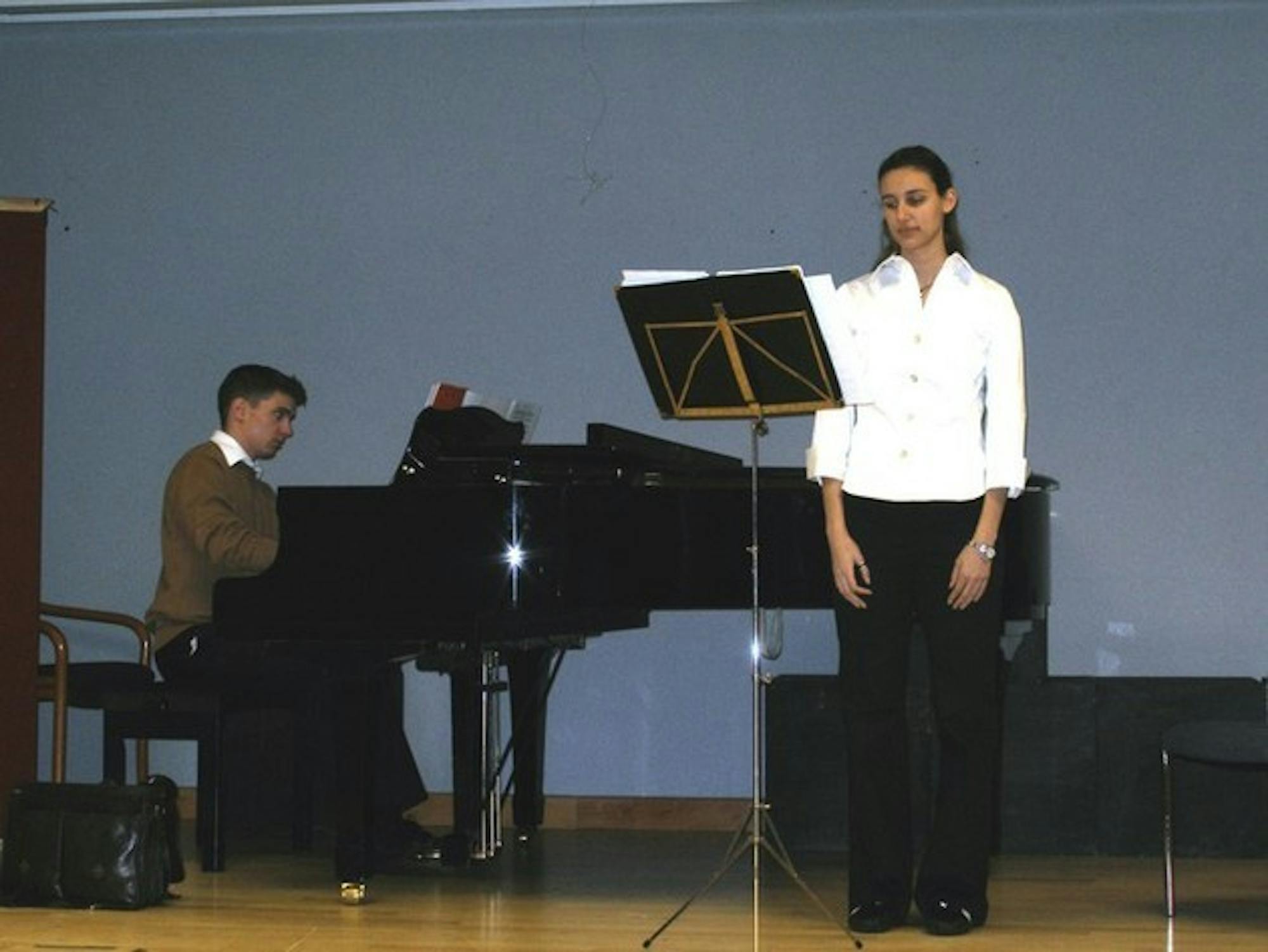Trailing between windowless practice rooms and the Paddock Music Library, six students conspicuously haunt the depths of the Hopkins Center. These brave seniors are pursuing the music department's Honors Program, which, as the Organization, Regulations and Courses book dauntingly informs, entails a performance or musical composition supported by an "analytical, historical, or interpretive" paper or a thesis paper and presentation that demonstrate substantial "analytical and research skills." These six music majors are bestowing their honors theses with more than "practice, practice, practice."
Kimberly Coppola '06, a music and government double major, cites vocal performance as her "most intimate interaction with music." She has elected the recital-and-paper route to a music thesis. For her recital, Coppola, a student of voice instructor Erma Mellinger, is preparing "an eclectic mix of both composers and compositional time periods," including works by Purcell, Mozart, Faur, Robert and Clara Schumann and Samuel Barber. Coppola will perform this comprehensive program in Faulkner Recital Hall on Sunday, May 7 at 7 p.m. For her thesis, Coppola plans to focus on 20th century composer Samuel Barber, "the composer whose work speaks to me most profoundly." Advised by professors William Summers and Steven Swayne, her thesis will formally and stylistically contextualize the Barber pieces featured in her recital.
Jordan Edmonson '06 found the inspiration for his thesis during the music department's Foreign Study Program to London, where he observed that different period orchestras "would often switch instrumentations as well as seatings in the concert hall." Edmonson's thesis compares 18th century orchestras in Mannheim, Vienna, London and Paris. Through a process that includes an impressive amount of "reading and researching," including public records and journal commentaries, Edmonson hopes to reveal "what made each city unique, and why they felt the need to shape their orchestra in a certain way."
Elizabeth Jackson '06, a music and chemistry double major, traces the inspiration for her thesis back to high school, when she heard "a gorgeous piece for cello and piano" in a film about cellist Jacqueline du Pr. After recognizing this piece as one of two cello sonatas written by Johannes Brahms, Jackson was "hooked." Her research process, which included "working through the sonatas in the practice room, listening to recordings, reading books about Brahms and even making a fake Facebook.com profile," has culminated in a comparison of the "low-pitched and melancholy" first sonata with the "brighter, powerful" second sonata. As part of the Vaughan Recital Series, Jackson will present her thesis, which weighs Brahms's background as a pianist against the cello sonatas, along with a performance of the two compositions on May 17 at 12:30 p.m. in Faulkner Recital Hall.
Peter Morgenstern '06, also a music and chemistry double major, is complementing his successful November 19, 2005 performance of Carl Maria von Weber's "Clarinet Concerto No. 2" with a paper that explores the concerto's composition in 1811. Morgenstern began work on the concerto during the Spring 2004 music department FSP to London. When conductor Anthony Princiotti selected the piece for the Dartmouth Symphony Orchestra's fall 2005 program, Morgenstern "decided it would be interesting to make it a part of my thesis." As advised by professor William Summers, Morgenstern's thesis will contextualize the concerto within Weber's career, evaluate the influence of clarinetist Heinrich Joseph Baermann and musically analyze the concerto itself. He will also perform as part of the Vaughan Recital Series on May 14 in Faulkner Recital Hall.
After becoming "fascinated with the complex rhythms of [Frank] Zappa's guitar phrases," Stephen Wood '05 decided to examine the musician's two major inspirations: Eddie "Guitar Slim" Jones and Johnny "Guitar" Watson. Wood's thesis, which entails transcribing guitar solos and analyzing them in biographical and musical contexts, bears particular weight because Jones and Watson "have really not been written about in an academic setting before. There are no dissertations on either musician," Wood explained. "On a larger level, I want to shine a light on the music of Slim and Watson. I think their music is too good to be so obscure."
As part of his thesis, Joseph Zenruffinen '06, a music major and history minor, will sing works by Schubert, Faur, Gerald Finzi and Cole Porter in a recital on May 14 at 7 p.m. in Faulkner Recital Hall. Zenruffinen's supplementary paper will investigate the history and background of Finzi's compositions, including his selection of texts by Thomas Hardy. Zenruffinen developed an interest in Finzi during the London music FSP: "Finzi, despite the Italian last name, was an extremely British composer in the sense that all of his influences were British, so everything really tied together for me that term." Zenruffinen enjoys the opportunity to explore a lesser-known artist, expressing that, in studying Finzi, "I felt like I would have more to offer."
Soon the practice rooms will be locked, the recital halls will be alight and final drafts of impossibly-long papers will flutter across professors' desks. The threads of inspiration encompassing various genres of music and a multitude of musicians will seem concluded, but do not be fooled; as Sergei Rachmaninoff famously promised (or warned), "Music is enough for a lifetime, but a lifetime is not enough for music."




![HONEYJOON_[Ines Gowland]_4.PNG](https://snworksceo.imgix.net/drt/7af2efc8-1bd1-4001-b754-e2718ce663b8.sized-1000x1000.PNG?w=1500&ar=16%3A9&fit=crop&crop=faces&facepad=3&auto=format)